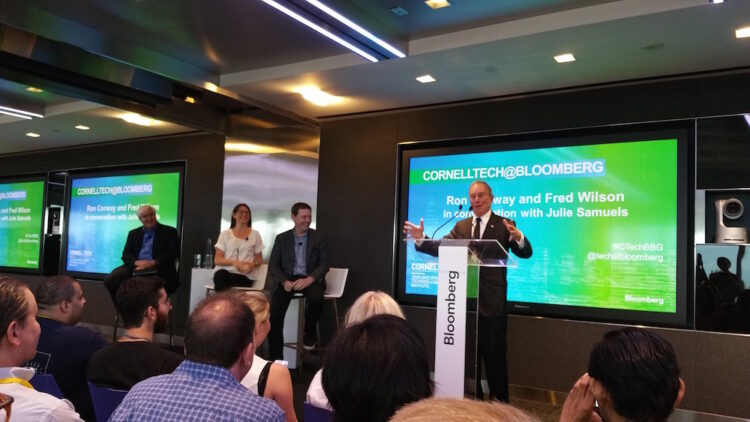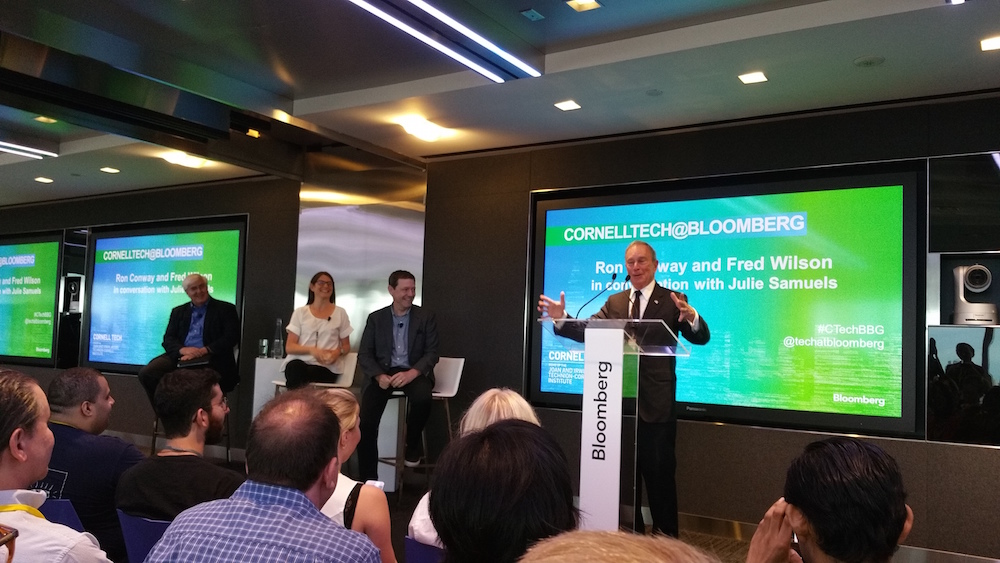What better way to close a panel at the stunning Bloomberg headquarters with two of the world’s smartest technology investors than to have Michael Bloomberg address a packed audience of budding entrepreneurs? The three-term New York City mayor spoke at the end of the conversation with Ron Conway and Fred Wilson hosted by Julie Samuels, Executive Director at Tech:NYC.
Ron Conway is Silicon Valley’s legendary super angel, philanthropist, and co-founder of SV Angel. Fred Wilson is a New York City-based venture capitalist, blogger, and co-founder of Union Square Ventures. Ron (#70) and Fred (#29) both hold positions on the Forbes Midas List, the annual ranking of the best dealmakers in high tech and life sciences venture capital.
New York’s most successful entrepreneur, who was laid off from Solomon Brothers in 1981, went on to become the world’s 8th richest person. Mr. Bloomberg shared his humble beginnings. He did not let the lack of personal computers, the internet, or distributed processing stop them. The Bloomberg team built their own.
Mr. Bloomberg also inspired with the tough lessons learned along the way.
- If you have a vision, go for it
- If you are going to build products for the world, you need to be where the world is
- Success is hard work
- You are not going to do it right every time
- You cannot have it all
Software is still trending and fueling the globalization of entrepreneurship as startups build software and tools that are transforming every industry. According to the Global Entrepreneurship Monitor, individuals in less developed economies tend to see more opportunities to start a venture. This phenomena is challenging venture capitalists, which largely remains a geographically constrained business.
Entrepreneurs are changing too. Women are more likely to start a business out of necessity than men. Today’s founder is agile, civically and philanthropically engaged, and can build things. They partner with accelerators to lower the barrier to entry for general management and financial skills. The resulting diversity in the founder community requires more diversity in the investor community as well.
Fred recently ruffled some feathers with his mention of a three-tier startup sector in the United States.
- Tier 1: Silicon Valley
- Tier 2: New York City, Boston, Los Angeles
- Tier 3: Seattle, Utah, Washington D.C., Chicago
Silicon Valley has witnessed the expected exponential effects of entrepreneurial success. New York’s startup environment, on the other hand, is self-sustaining as traditional industries, such as fashion, food, healthcare, education, and energy, become technology-enabled. The technology industry has created 4% of the jobs in New York City.
Cornell Tech is also introducing a revolutionary model for graduate education that fuses technology with business, law, and creative thinking to produce visionary ideas grounded in significant needs that will reinvent the way we live.
New York is a much bigger and more diverse market, where most entrepreneurs encounter regulatory pushback faster. Archaic laws that have not kept pace with technology exist everywhere and need to be updated. Consumers are on the side of technology, and they do not like it when they are told that they cannot have innovation.
Organizations like Tech:NYC and sf.citi are helping by partnering with venture capitalists to support the growth of the technology sector and to increase civic engagement by leaders of the technology community. Key areas of need include data privacy, data security, and tax regulations. As startups scale, they also need to address compliance issues on a country-by-country basis.
With digital trends integrating into every aspect of day-to-day life, the industry requires leaders with staying power who patiently pursue results on long-term issues. Ron and Fred are two such leaders. They are actively engaged in their communities spending time, energy, and capital on complex civic issues. Ron’s passions are for gun safety and immigration reform. Fred is a proponent of education, particularly giving kids access to computers and teaching them basic programming skills.



